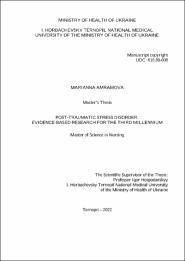| dc.description.abstract | Understanding the development of PTSD starts with understanding the theories postulated in helping the body respond to adversity.
The data for this project was collected through observation at various hospitals and has been compared with literature database analysis.
The purpose of this project is to provide understanding the development of PTSD starts with understanding the theories postulated in helping the body respond to adversity. Emergency respondents and rescue workers are affected by tragic events, just as much as the real victims. They put their lives in harm’s way to save others and might get injured or even have themselves killed, maimed for the rest of their lives or suffer adverse psychological effects in the process. These include PTSD that may predispose them to substance abuse, depressive episodes, anxiety, and even suicidal tendencies. These effects may have consequences not just on their health, but also on those with whom they closely interact, such as their spouses. Spouses may suffer divorce, since divorce rates are higher among these populations; their children may suffer neglect, in the case where these people (emergency workers) who are breadwinners’ resort to substance abuse and neglect of their parental duties. On the larger scale, the economy might suffer a lack of productivity, due to suboptimal performance as a result of diminished workplace productivity. These findings indicate the need for research-based mechanisms, such as counseling and fostering strong social relationships that can be used in the care of these individuals. | uk |

